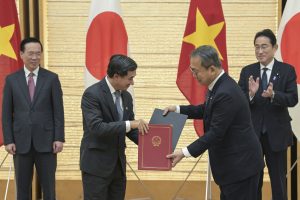Japan and Vietnam have officially established a comprehensive strategic partnership, pledging a broad expansion of security and economic ties on the 50th anniversary of the two nations’ diplomatic relations.
The announcement came after Japanese Prime Minister Kishida Fumio and Vietnamese President Vo Van Thuong met in Tokyo yesterday for talks, during which the pair pledged to take their nations’ ongoing cooperation to “new heights and to further expand it to new fronts,” according to a joint statement released after the meeting.
Under this “Comprehensive Strategic Partnership for Peace and Prosperity in Asia and the World,” to give the relationship its full official title, Kishida and Thuong agreed to broaden their security cooperation, particularly on the provision of Japanese defense equipment, maritime security cooperation, and technology transfers. The two leaders also “concurred in continuing strengthening economic linkages between the two countries and affirmed the importance of cooperation to ensure economic security.” Japan is Vietnam’s fourth-largest trading partner – bilateral trade reached $50 billion last year – as well as its third-largest source of foreign investment.
Thoung is on a four-day visit, during which he is scheduled to visit the Imperial Palace for a meeting and lunch hosted by Emperor Naruhito and Empress Masako. He will also deliver a speech to the Lower House of the Japanese parliament.
In a speech broadcast on national television, Thuong described the elevation of ties as “an important event, opening a new chapter in the Vietnam-Japan relation.” At a joint news conference after their meeting, Kishida said that Vietnam was “a key partner in achieving a free and open Indo-Pacific.”
Vietnam’s elevation of ties with Japan is a reflection of the two nations’ overlapping concerns about China’s rising power and influence, which has underpinned a strategic convergence between the two nations over the past decade. This has involved a thickening of their defense ties, including Japan’s provision of patrol vessels to Vietnam to help strengthen its maritime law enforcement capability at sea and an in-principle agreement, signed in 2020, allowing Japan to export defense equipment and technology to Vietnam.
There are also complementarities on the economic front: Japan wants to diversify important supply chains away from China, while Vietnam has long sought to reduce its heavy reliance on its northern neighbor, given that the two nations’ supply chains are closely enmeshed.
In this sense, the elevation of Japan-Vietnam ties can be seen as a complement to Vietnam’s historic upgrade of relations with the United States in September, during a state visit by President Joe Biden to Hanoi. In addition to announcing the comprehensive strategic partnership, a two-tier upgrade from the relatively lowly “comprehensive partnership” established in 2013, Biden and his hosts signed multiple cooperation agreements, including on semiconductors and critical minerals.
These two upgrades, which have elevated Japan and the U.S. to the level occupied by China, Russia, India, and South Korea, are part of a broader elevation of Vietnam’s relations with its closest economic and security partners. Hanoi is reportedly considering upgrading its relationships with Singapore, Australia, and Indonesia to the same level.
Taken together, this flurry of upgrades is a good example of the approach that Vietnam has taken to its foreign policy since the end of the Cold War. During that time, it has adroitly balanced its intimate and fraught relationship with China by reassuring Beijing’s leaders of its peaceful intentions, while building constructive relationships with as many foreign partners as possible.

































